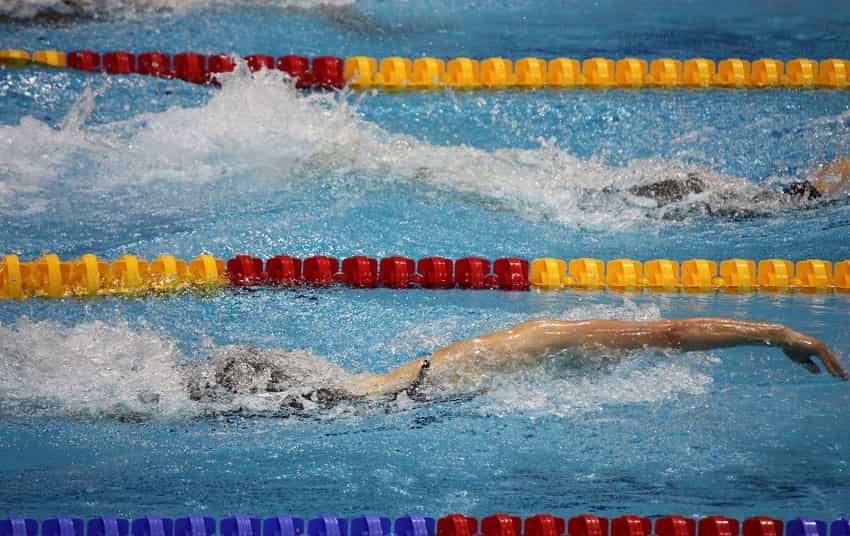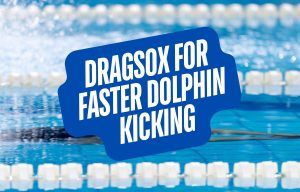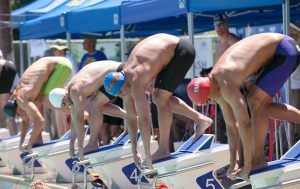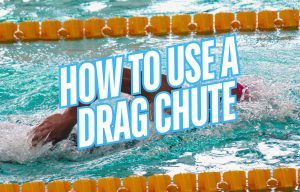Swimmer’s ear is kind of the worst.
As a lifelong competitive swimmer, I have the unfortunate distinction of having caught a case of swimmer’s ear more times than I can count.
It seemed like it has always been a battle to keep water out of my ears when swimming.
I spent many days and evenings as a child, teenager, and even a few as an adult with my head buried in a pillow, wishing to the chlorinated gods to get the pain, throbbing, and stuffy hearing to pass more quickly.
How does swimmer’s ear happen?
Swimmer’s ear also goes by the fancy-pants science name acute otitis externa.
How it happens is pretty straight-forward, and it’s not because you are a bad person: Water goes in your ear, stays there, and a bacterial infection grows from the ideal combination of warmth and moistness in your ear canal.
Swimmer’s ear comes in both acute and chronic forms. Also, here’s a fun fact: Ten out of ten people surveyed said they’d rather get punched in the mouth than experience swimmer’s ear again. (That’s just me asking myself ten times. Not very science-y.)
When swimmer’s ear kicks in, all sorts of symptoms come flying in.
At first a slight itch (resist the urge to spear eardrum with finger, resist!), pain in the form of someone taking a flamethrower to your ear canal, swelling, redness, and even temporary hearing loss.
The height of grossness with swimmer’s ear comes when fluid and puss run out your ear canal.
(If you sleep or rest with your bad ear facing down on your pillow, I would super recommend double-bagging your pillow with a couple pillow-cases that you aren’t overly committed towards.)
One of the tools of the trade to nuke that bacterial infection is to use swimmer’s ear drops.
Using swimmer’s ear drops to solve the case
Outside of some of the usual and drop-free tricks to getting water out of your ear (more on those shortly), there are swimmer’s ear drops.
They are typically very simple solutions designed to help dry your ear and zap the bacterial infestation in your ear canal.
You drop a couple drops down your ear canal, let the stuff do its magic for a couple minutes, sometimes hear a sound like paper crinkling (very trippy the first time you experience it), and re-tilt your head, allowing everything to run out the side of your head.
Here’s a breakdown of my favorite swimmer’s ear drops.

Swim-EAR Drying Aid.
95% isopropyl alcohol, with an inactive 5% ingredient that is anhydrous glycerin, the Swim_ear Drying Ear Swimmer’s Ear Drops are perfect for drying your ears after swimming, showering, bathing, or dunking your face in the neighborhood pool on a hot day.
Use 4 to 5 drops in each of your affected ears, don’t put it in your eyes, and keep the bottle properly closed and away from fire. (It’s flammable, yo.)
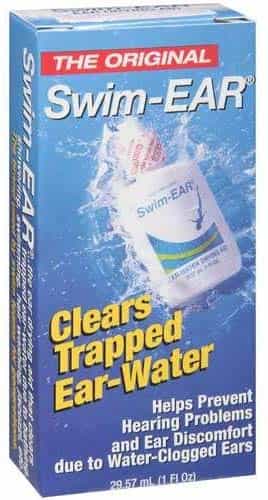

Auro-Dri Swimmer’s Ear Drops
Auro-Dri Swimmer’s Ear Drops are designed specifically to clear water-clogged ears. They are safe for both adults and children. The solution is 95% isopropyl alcohol and 5% anhydrous glycerin.
They recommend 4-5 drops in each ear after swimming, keeping the drops in your ears for several minutes before titling it back the other way and allowing the drops to run out with gravity.
These ear drops are also the only ones recommended by the American Swim Coaches Association.
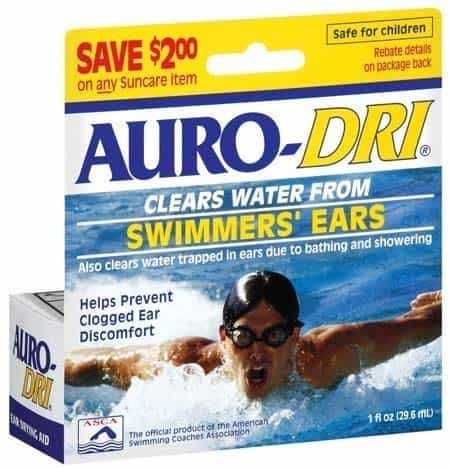

Bionix Health After Swim Water Removal
These aren’t swimmer’s ear drops, per se, but they are designed to accomplish the same end result.
They are pads, made without alcohol, that have a flared tip that goes into the ear canal and sucks up water.
Each pad is able to absorb five times the amount of water an ear canal can hold, so you only need to use one per serving, per ear. The pads are designed in such a way that you can’t deep-six them into your ear canal, aggravating or punching a hole into your eardrum.
While novel in its approach, these pads weren’t super well-rated on Amazon. The last time I looked, almost 20% of the ratings were one-star, with numerous users complaining that it didn’t work for them.
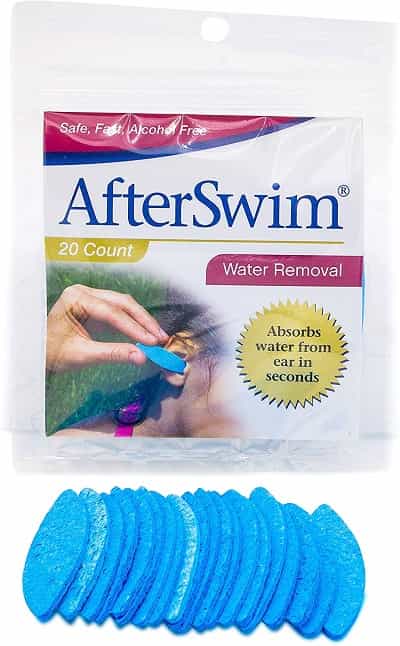

How to prevent needing swimmer’s ear drops in the first place.
If you surfed here with an existing case of swimmer’s ear, this information might not help your current predicament. But it might help you to avoid getting another case of swimmer’s ear down the road.
Of course, the best thing you can do is to prevent swimmer’s ear in the first place.
There are some easy things you can do to cut down the likelihood of getting this pain-in-the-pull buoys ailment:
Wear earplugs when you go swimming.
Sure, it’s an extra step before getting into the water for your workout, and swimmer’s earplugs don’t last all that long before they lose their malleability.
But find a set that work and stick with them. For almost my entire swimming career I have leaned on earplugs for swimming laps. (My favs are Mack’s Silicone Soft Putty—hands down.)
Here’s some good news: Wearing earplugs while swimming won’t interrupt your joy of the sport, it shuts out the loud mouth-breathing of the other swimmers in the pool, and wearing them can even make bone-conducting waterproof music players sound better.
Suck it, earaches!
Tip for smaller swimmers with tubes in their ears, perforated ear drums, or simply are prone to earaches: Combine swimmers’ earplugs with an ear band for swimmers. The 1-2 punch protects the ears and keeps the earplugs securely in place.
Dry your ears properly.
If you can’t stop water from getting in, you can give getting the water out an assist.
Start with gravity. Tilt your head. Shake your head. If this doesn’t take, a hair dryer, on medium heat and from about a foot away, can help dry the inside of your ear canal as well.
How not to dry your ear canal? Ramming your finger into your ear canal. Stuffing your delicate ear canal full of Q-tips, cotton swabs or toilet paper. (Yes, I’ve seen this on a few occasions.)
Here’s something to super not do.
Quick story: In my early 20s, I jumped off a decent-sized cliff at a local lake. My entry was clean; so clean that I went deep enough that the pressure ruptured my ear-drum.
Only I didn’t know this. I thought the pain was just another classic earache.
Time to dry my ears out, right? I went home, grabbed an eye-dropped and dropped a couple shots of rubbing alcohol down my ear canal. My friends nearly had to peel me off the ceiling it hurt so much.
The lesson? If your ear is injured, or ruptured, do not use swimmer’s ear drops or rubbing alcohol.
Don’t rely on a swim cap to keep water out of your ears.
This is a frequent cause of misunderstanding when beginners are outfitting themselves for lap swimming.
Your favorite swimming cap isn’t meant to keep water out of your ears. It’s not a condom for your head. Heck, swim caps aren’t even meant to keep your hair dry.
They keep your hair from dispersing into the pool (and filters), help protect hair from chlorine (especially when you shower and load up your hair with fresh water before jumping), and keeping your hair out of your eyes (so you can see where you are going when swimming).
Sorry to be the bearer of bad news. But swim caps won’t keep water out of your ears when swimming.
Serious note: This information is purely informational and not to be construed as medical advice. Seek the help of a medical professional if your ears have discharge, there is pain and irritation in the canal, or you are experiencing dizziness or nausea.

